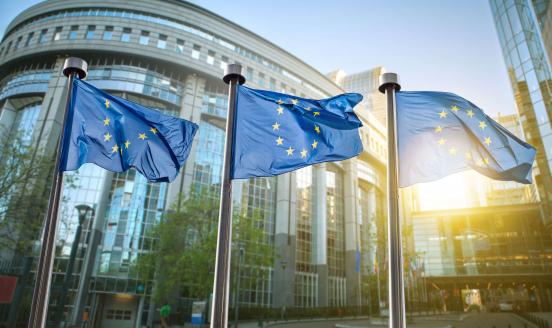Questions to the Competition Commissioner-designate
Commissioner Vestager has been given two portfolios; Executive Vice-President for a Europe fit for the Digital Age and Competition Commissioner. While

In her Mission Letters to Commissioner-designate, Margrethe Vestager, the European Commission’s President-elect Ursula von der Leyen, created a series of interrelated issues of that the Members of the European Parliament may well explore during the hearing of Commissioner-designate Vestager scheduled for 8th October. Although the Parliament only has a consultative role in competition law matters, scrutiny of the functioning of the Union’s executive is not. Indeed, the President-elect’s call for strengthening the Commission’s special partnership with the Parliament and Commissioner Vestager has been at pains to engage with the Parliament (as she committed to do in her original Hearing as Commissioner-designate for Competition, on 2 October 2014).
Significant Concerns of Overlap?
Strengthening the EU technological leadership and strategic autonomy: The Mission Letter to Commissioner Vestager is clear, as Executive Vice-President for a Europe fit for the Digital Age (Digital EVP), Commissioner Vestager will have an industrial policy mandate to maintain European digital leadership, boost digital efforts and ‘move first’ on new-generation technologies. A key task of the Digital EVP is “strengthening [Europe’s] technological leadership and strategic autonomy”. To do so, the Digital EVP will coordinate the work of the Commissioner-designate for Internal Market, Sylvie Goulard, whose own task is to “contribute to the work on enhancing Europe’s technological sovereignty”, including on blockchain, high-performance computing, algorithms, and data-sharing and data-usage tools, jointly defining standards for 5G networks and new-generation technologies. There is, in principle, nothing odd about developing an industrial policy approach seeking to improve the conditions for the competitiveness of European firms.
Enforcing EU competition law: However, as a Competition enforcer, Commissioner Vestager’s Competition functions may well be brought into conflict with a desire to promote EU technology leadership, in particular. After all, competition enforcement aims to objectively ensure that competition on the market yields long-run consumer welfare. On the other hand, industrial policy focused on strengthening Europe’s technological leadership and strategic autonomy subjectively aims to promote particular European sectors (and, by extension, companies) as well as overarching political priorities of strategic autonomy.
The two approaches are conceptually different; competition enforcement requires neutrality to towards the nationality of the firms in question, open-mindedness and confidentiality of proceedings. Proposing of legislation includes structuring markets, seeking predetermined outcomes, consultation and openness. We may have an in-coming European Commission with a more directed industrial policy that may not sit well with traditional competition enforcement. What has changed is that the Commissioner in charge of competition now also has an industrial policy function.
Conflicts between Portfolios
The situation may even run into potential conflicts of interest. After all, it is foreseeable that the desire to promote the EU’s strategic interest influence competition enforcement. Only a few months ago, in the Siemens/Alstom merger prohibition, did we see a clear tension between objective competition enforcement and industrial policy interests. Would it be possible for the Digital EVP to fulfil the mandate to boost European digital leadership or sovereignty if, as Competition Commissioner, they took the decision to prohibit the merger of ‘European champions’ or they permitted a non-European firm acquiring next-generation technology developed in Europe?
Another good example is digital taxation; as Digital EVP, the Mission Letter states that Commissioner Vestager “will coordinate the work on digital taxation to find a consensus at international level by the end of 2020 or to propose a fair European tax”. How the Digital EVP mandate will affect, or be affected by, on-going state aid cases on digital taxation that, as Competition Commissioner, Commissioner Vestager will be responsible for. Recent statements[1] by the Commissioner highlight this overlap; the Commission will look at “a combination of efforts to make legislative changes, enforce State aid rules and a change in corporate philosophies” working at national, European and global levels. Indeed, where ongoing digital competition cases may touch on the broader questions of policy or could be resolved subsequent regulation,[2] there may be a perception of conflicts of policy interest. What mechanisms should there be to ensure that cases are not being used to create a precedent in order to drive policy?
The European Parliament’s written questions touch on this by asking how a clear separation between the two key portfolios can be ensured. Should those with intimate knowledge of ongoing enforcement cases, notably in the Cabinet and the ultimate decision-maker, need to forgo involvement in working on parallel policies and regulation? Would the loss of efficiency be tolerable? A clear separation may require legal, procedural and physical measures to ensure a functional a division between enforcement; priorities and outcomes from industrial policy. The President-elect, the Legal Service and the Secretariat General may play a role.
Policy Chicken and Competition Egg?
President-elect von de Leyen has asked the Competition Commissioner to strengthen enforcement and review Europe’s competition rules. Should competition enforcement and competition policy actions touching on digital policy would need to be in line with the direction coordinated by the Digital EVP, if these are to strengthening Europe’s technological leadership and strategic autonomy?
One could ask how Commissioner Vestager will ensure that she can act, as Competition Commissioner, autonomously from industrial policy directives or will enforcement priorities be dictated by the industrial policy strategy? Having separate Commissioners overseeing policy and competition has traditionally avoided such tensions, but this dual portfolio has potentially placed Commissioner Vestager is a difficult position.
Competition Commissioners possess, as they should, significant flexibility in deciding where to commit resources, which investigations to prioritise, what sectors or practices to focus on etc. But companies under investigation be confident that their case will not be used as vehicles for broader policy-making purposes.
The Parliament’s Written Questions ask how possible trade-offs would be managed between competition and digital strategy design. Traditionally, competition law has essentially excluded the need for a ‘trade-off’ between industrial policy and competition law by ensuring the objective application of law to fact. In theory, therefore, there are no-trade-offs between competition and digital strategy design, unless the new Commission is taking a different approach to the application of competition law and expecting competition to be prioritised in a way that supports a refocused industrial policy.[3] In the Competition Chapter to Bruegel’s Memos to the EU leadership 2019-2024 we noted that, one of the Competition Commissioner’s challenges will be to know what competition policy can bring, within the scope of the law, to the European industrial policy debate while not threatening the integrity of the competition system in Europe or at the international level. The question is rather whether competition policy will be subject to the overarching Commission policies of technology sovereignty, leadership and autonomy; and if so, what are the boundaries of such notions?
Competition Decisions by the College
Given the intense pressure from certain member states seeking to politicise competition law, the most logical approach might have been to create a structure that isolates the Competition Commissioner in order to ensure the independence of the decision-maker responsible for enforcement. The new structure appears to complicates matters.
For many observers, the European institutional structure for taking competition decisions was illogical. The College of Commissioners, made up of political appointees, is expected to take competition enforcement decisions by majority vote. These decisions can carry sanctions of such significance that penalties are quasi-criminal in nature. Yet, the majority of Commissioners are responsible for portfolios unrelated to competition matters and rely on briefings provided from DG Competition, rather than on any direct involvement in the case, and they “…vote to take a decision without personally having heard the case against the proposed decision”[4]. This may explain why the college will always support the Competition Commissioner’s proposed decision. As one eminent European jurist noted, “No competition agency on earth takes decisions this way, nor does any criminal instance in any democratic country”[5]. This leaves the College in an invidious position where it delegates competition enforcement to one Commissioner, yet is collectively responsible for decisions which can have a significant impact on the internal market.
Rather than create a situation where the Competition Commissioner stands outside the Commissioner clusters, the decision by the President-elect to allocate industrial policy oversight as well as delegated competition powers by no means improves the situation. How will the new structure affect the competition decision-making mechanism at college level?
Independence of the Decision-Maker
At her hearing before the European Parliament in October 2014, as Commissioner- Designate for Competition, Commissioner Vestager stated that “The authoritativeness of EU competition enforcement rests in large measure on our independence, impartiality and respect of confidentiality in the handling of individual cases”. To be sure, while there is no question that Commissioner Vestager or her team are not independently minded. However, as explained above, this double portfolio – and particularly the overlapping obligations - places the Commissioner in a difficult situation.
Is it feasible to separate the digital policy and competition functions to ensure that there is no perception that digital policy is influencing individual cases? It is true that inspiration could be drawn by other bodies where competition heads hold offices in other government departments, but it seems that the critical element is the mandate to drive policy (i.e. seeking a foregone conclusion) that promotes European autonomy and sovereignty. No matter how clear the Commissioner is on independence unless there are mechanisms to ensure transparency and objectivity, there may be concerns that the policy ‘tail’ wags the enforcement ‘dog’.
Resources & Decision Making
The task of Competition Commissioner is time-consuming. Without a doubt, involvement in coordination on Europe’s digital policy will be too. With two very significant portfolios to oversee, there is a risk that Commissioner Vestager will not have sufficient time to oversee competition investigations. The effect may be that the legal decision taker is further removed from cases and, importantly, from the parties involved.
If the Competition Commissioner becomes resource-constrained and relies on the services to evaluate the strength of a case, is there a risk that ‘decisions’ are effectively a rubber-stamping?[6] How will the Commissioner ensure that she is fully engaged in cases, in order to discharge her delegated powers?
The likelihood is that the Cabinet and DG Competition will be more involved in the executive decision and more involved in key decisions in cases, with the formal decision-taker being increasingly on briefs from the services. Boosting internal checks and balances will be particularly important. For example, instituting an effective peer-review panel, boosting powers of the Hearing Officers, or ensuring that the Chief Economist a greater role. Of course, internal process changes will need to be made transparent to the parties, which DG Competition has been very good at in the past. However, given the quasi-judicial nature of European competition enforcement and significance of its decisions, how will due process, transparency, independence and decisional autonomy be ensured?
‘Geopolitical Commission’
The President-elect has stressed that the Commission must support industry to adapt to globalisation and address the unlevel-playing field created by “the distortive effects of foreign state ownership and subsidies in the internal market”. Although many issues can be dealt with outside the field of competition law (e.g. anti-subsidies, public procurement, reciprocity provisions) there is a role for competition law in addressing the effect of such distortion. While the problem of foreign state ownership is well understood in Europe, it is unclear whether the Commission has assessed its scale of the issue and what proportionate measures tools could be developed to address such distortion?
Finally, the ‘geopolitical’ aspects of competition policy need to be worked through. Not only through stronger global cooperation among competition authorities, beyond existing multilateral and bilateral discussions, but to ensure that the European Commission can engage with third-country agencies to protect Europe’s ‘important interests’ where a third-country agency appears to be applying their competition law in a protectionist manner.
Vesting delegated competition enforcement powers in the individual who is also responsible for driving digital industrial policy may lead to confusion, consternation or conflict. Whether meaning to or not, this situation creates a perception of overlap that will need to be addressed, especially in an area as complex and geopolitically sensitive as digital technologies. The upcoming hearings are an opportunity to get clarity on the Digital EVP/Competition Commissioner-designate intends to prevent any confusion and ensure that she can discharge her duties effectively and in a way that guarantees the core elements of existing European competition law. I recommend the Members of the European Parliament ask question to elucidate these points.
[1] Statement by Commissioner Margrethe Vestager following today's Court judgments on two tax State aid cases (Fiat in Luxembourg and Starbucks in the Netherlands), 24 September 2019, https://ec.europa.eu/commission/presscorner/detail/en/statement_19_5831.
[2] See the mobile roaming tariffs investigation into various mobile operators, ultimately closed in 2007 as the issue was taken over by a European regulation. The Commission’s press release at the time (see https://europa.eu/rapid/press-release_IP-07-1113_en.htm?locale=en) highlighted differences between antitrust enforcement in individual cases versus regulation; it noted that the Regulation applies to all EU countries, to all mobile phone operators and also addresses concerns for the future.
[3] Politico, COMPETITIVE EDGE: Competition becomes the servant of industrial strategy, By Thibault Larger, 9/11/19.
[4] Douglas H. Ginsburg and Taylor M. Owings, Due Process in Competition Proceedings, Competition Law International, Vol 11 No 1 April 2015.
[5] Ian S. Forrester, Due process in European competition cases A distinguished institution with flawed procedures, (2009) 34 E.L. REV. December.
[6] Douglas H. Ginsburg and Taylor M. Owings, Due Process in Competition Proceedings, Competition Law International, Vol 11 No 1 April 2015.



